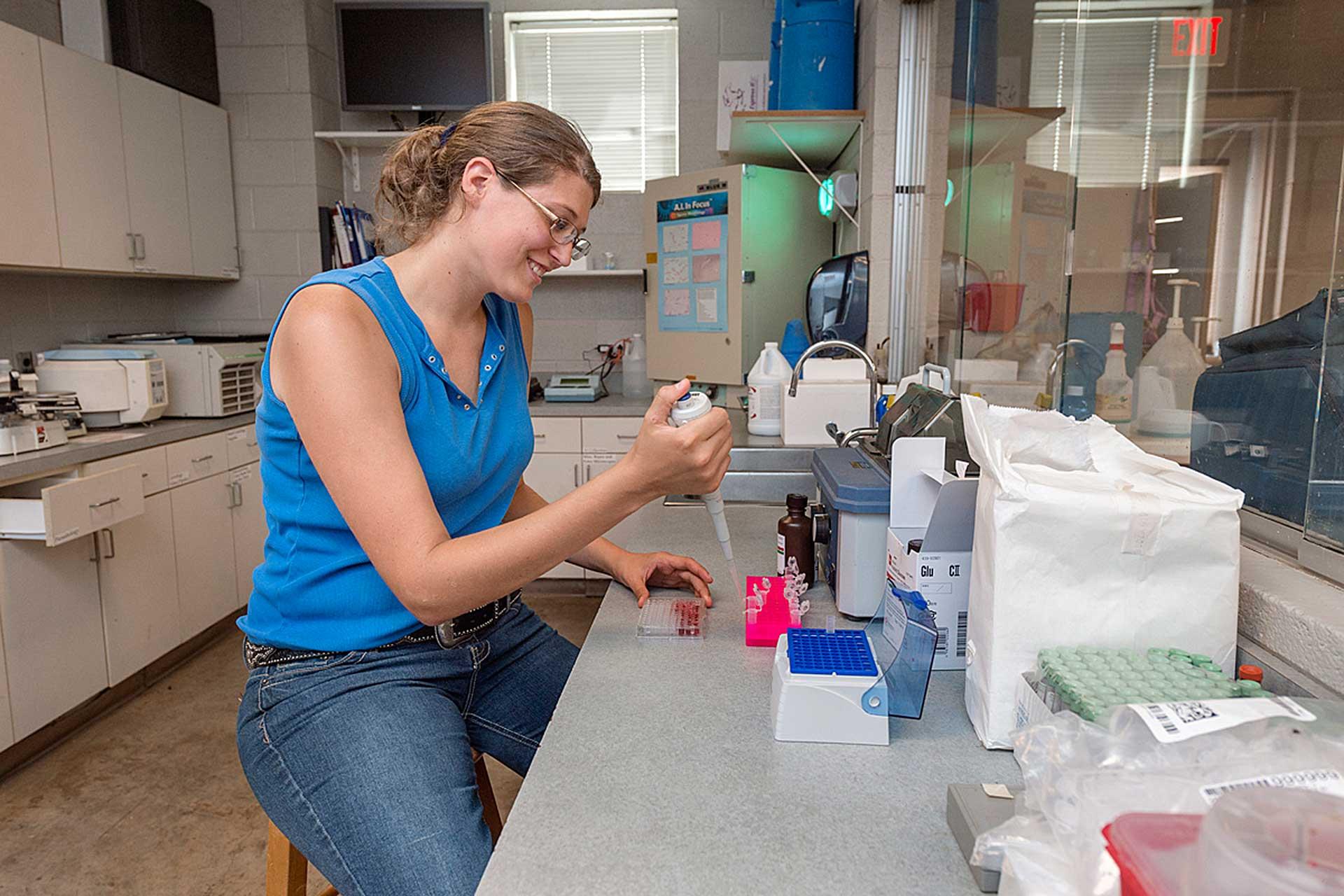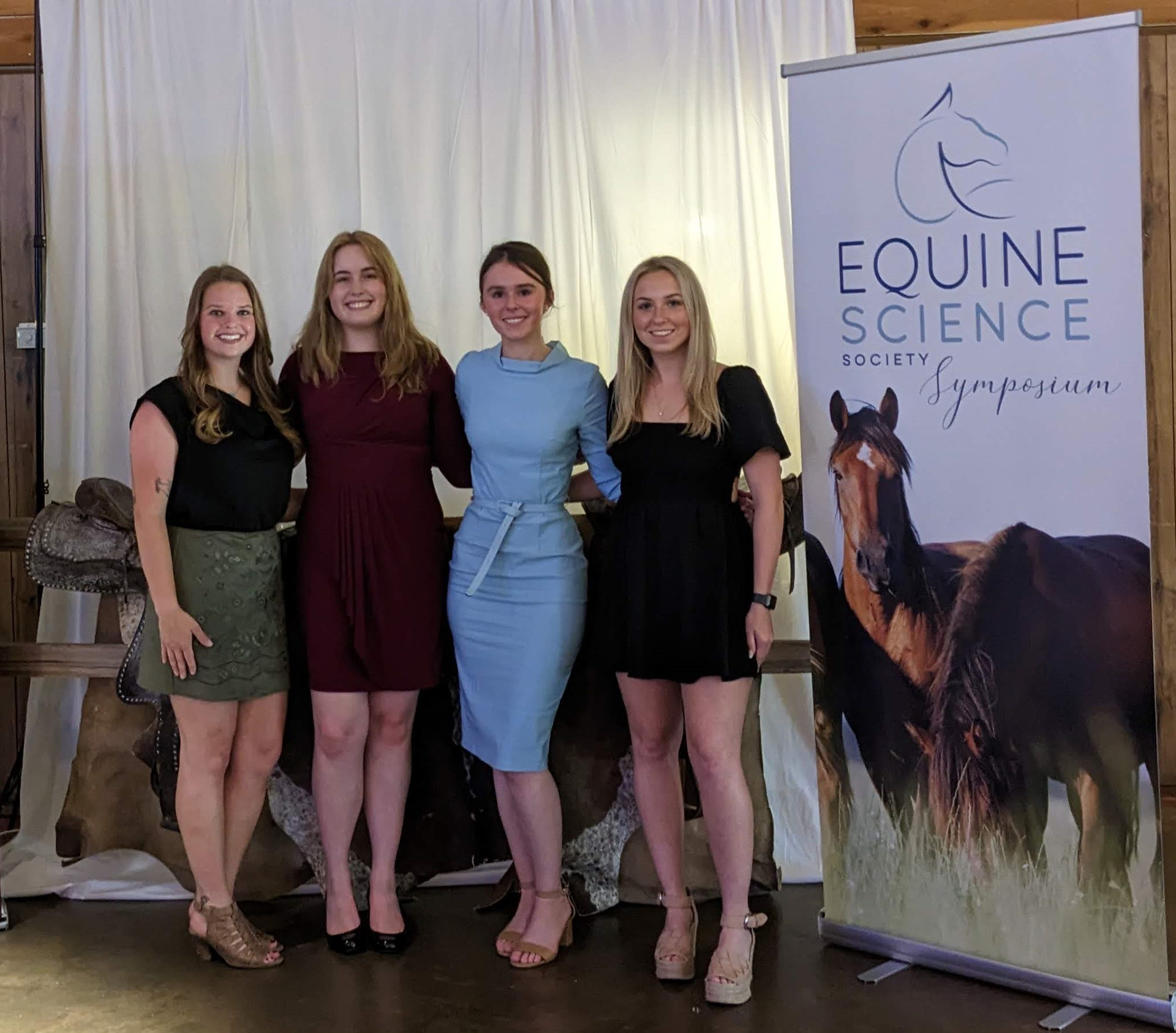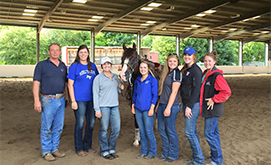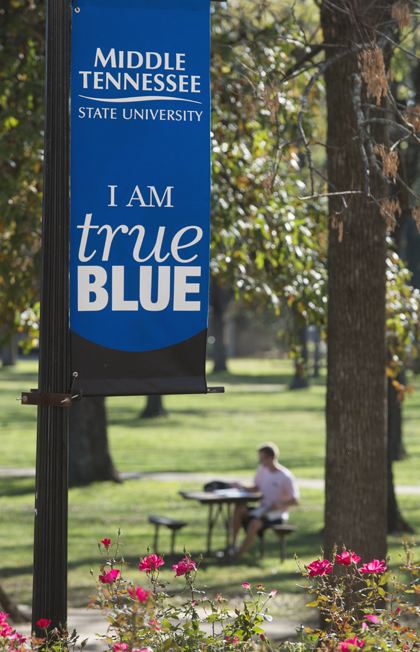
Horse Science
Choose Equine Industry Management for business and production focus and excel as a facility manager or event organizer.
Horse Science, Industry Management Concentration, M.S.
The Industry Management concentration is designed for students who are more interested in the business or production aspects of the equine industry. There are many career options for graduates of this program and they may include:
- Facility Manager
- Equine Event Management
- Equine Event Official
- Equine Association Employment
Faculty members mentor students in curriculum development and provide training in scientific methods, principles of equine student education and instruction, and general industry practices.
All M.S. degree candidates share a common core of coursework in statistics, research methods, and multiple disciplines in horse science and animal science.
A significant number of elective credit hours are available, permitting each student to customize the program with courses in other departments.
A limited number of graduate teaching assistantships are available.
If you live in one of these states: FL GA WV; you may be able to attend MTSU at in-state rates under the Academic Common Market program.
News Briefs

Graduate student uses equine therapy to aid veterans
The Equine Science Society held its biannual Symposium in Grapevine, Texas in June 2023. During this Symposium, students and professionals alike presented recent research, networked, and collaborated on future research. Two students in the M.S. Horse Science Equine Physiology program presented research (Jenelle Stellmack and Alyson Snyder), along with one Undergraduate student (Fallon Marshall). Graduate student Jenelle Stellmack was awarded 3rd place in the Production and Management Graduate Student Competition, and 2nd Alternate in the Journal of Equine Veterinary Science Publication Award. Jenelle's abstract was titled 'Comparison of Physically conditioned and non-conditioned university horses after semester break.' All abstracts are published with conference proceedings in the special issue of the Journal of Equine Veterinary Science.

MTSU students teach horsemanship clinics in Europe
Horse Science graduate students Helen Hardy, Ariel Herrin and Andrea (Smith) Rego conducted international horsemanship clinics in Europe in summer 2015 after MTSU won a grant from the American Quarter Horse Association. Dr. Holly Spooner, director of the Horse Science master's program, headed up the overseas trip that also included undergraduates Seneca Ewing and Delaney Rostad. "The chance to travel to these countries and see other parts of the world, all while spreading my passion of the American Quarter Horse, is without a doubt the experience of a lifetime," says Herrin, a 2014 world champion. The Middle Tennessee State University students expanded their teaching and horsemanship skills while meeting new friends in Sweden and England, Spooner says. "We definitely learned that the language of horses is universal," Rego says. Hardy says she learned from both participants and fellow clinicians: "I am so fortunate to have gained a unique perspective on the international industry that have benefitted me as an instructor and rider."
News Briefs
Graduate student uses equine therapy to aid veterans

The Equine Science Society held its biannual Symposium in Grapevine, Texas in June 2023. During this Symposium, students and professionals alike presented recent research, networked, and collaborated on future research. Two students in the M.S. Horse Science Equine Physiology program presented research (Jenelle Stellmack and Alyson Snyder), along with one Undergraduate student (Fallon Marshall). Graduate student Jenelle Stellmack was awarded 3rd place in the Production and Management Graduate Student Competition, and 2nd Alternate in the Journal of Equine Veterinary Science Publication Award. Jenelle's abstract was titled 'Comparison of Physically conditioned and non-conditioned university horses after semester break.' All abstracts are published with conference proceedings in the special issue of the Journal of Equine Veterinary Science.
MTSU students teach horsemanship clinics in Europe

Horse Science graduate students Helen Hardy, Ariel Herrin and Andrea (Smith) Rego conducted international horsemanship clinics in Europe in summer 2015 after MTSU won a grant from the American Quarter Horse Association. Dr. Holly Spooner, director of the Horse Science master's program, headed up the overseas trip that also included undergraduates Seneca Ewing and Delaney Rostad. "The chance to travel to these countries and see other parts of the world, all while spreading my passion of the American Quarter Horse, is without a doubt the experience of a lifetime," says Herrin, a 2014 world champion. The Middle Tennessee State University students expanded their teaching and horsemanship skills while meeting new friends in Sweden and England, Spooner says. "We definitely learned that the language of horses is universal," Rego says. Hardy says she learned from both participants and fellow clinicians: "I am so fortunate to have gained a unique perspective on the international industry that have benefitted me as an instructor and rider."
Related Media

A wide variety of careers are associated with the horse industry. A student’s talent may pertain directly to horses or to science, education, marketing, management, or business. Some potential career options with advanced degrees in Horse Science follow:
- Collegiate horsemanship instructor or equestrian team coach
- Community college or technical school instructor
- Equine behaviorist
- Equine exercise physiologist
- Equine facilities manager
- Equine nutritionist, equine feed specialist, or nutrition laboratory technician
- Equine reproductive physiologist
- Horse extension specialist or extension agent
- Instructor or program coordinator of therapeutic riding and equine-assisted therapies
- Journalist for major horse publications (breed or discipline-specific magazines)
- Pasture management specialist
- Pharmaceutical representative for equine products
- University instructor or teaching professor specializing in horses
- Collegiate coaches and instructors
- Youth coaches and instructors
- University and private labs
- Private business ownership
- Equine Affairs
- High School Agriculture teachers/FFA advisors
Employers of MTSU alumni
- American Quarter Horse Association
- American Paint Horse Association
- Mars Petcare
- Excel Equine
- Horse trainers
- Pfizer
- Alltech
- 4-H or Adult Extension agents in numerous states
- Youth Equestrian Development Association
- FarmVet
- Purina
- Nutrena
- Tribute



Applicant Selection Procedure
The selection procedure is a two-phase process and normally begins at the April 15 and Oct. 1 deadlines for Fall and Spring admission.
- The first phase is objective. The Horse Science Graduate Selection Committee evaluates academic transcripts for overall GPA and completion of at least 12 credits of upper-division, horse science and/or animal science undergraduate courses with a minimum GPA of 3.00. Each applicant’s GRE or MAT scores are evaluated, and letters of recommendation are reviewed. The first phase will not begin until applicants have submitted all required portions of their application to the College of Graduate Studies. Admission is not guaranteed by meeting minimal admission requirements. Students are selected from a pool of qualified applicants.
- The second phase involves an evaluation of non-academic attributes of individuals selected only after completion of the first phase. This includes a personal interview with the Horse Science Graduate Selection Committee, by invitation for qualified applicants only. Travel to and from the personal interview is done at the applicant’s expense. Not all applicants are invited for the personal interview. Characteristics evaluated during the personal interview include, but are not limited to, motivation, maturity, leadership potential, personal qualities, experience with horses, knowledge of the horse industry, professionalism, long-term goals, and potential fit in our Horse Science M.S. program.
Degree Plan forms
Facilities
Financial Assistance
A limited number of graduate teaching assistantships are available for M.S. in Horse Science students. Stipends for Graduate Teaching Assistants and Graduate Research Assistants are determined by the College of Graduate Studies based on a review of market factors and the availability of funds. Stipends awarded through external funds such as grants may vary in amount from other assistantships awarded by the university.
All applicants to the M.S. in Horse Science program meeting the minimum GPA qualification of 3.00 will be considered for Graduate Teaching Assistantships. Graduate Teaching Assistant positions are very limited and are awarded on a competitive basis, at either a full or half level. These assistantships include partial or full payment of tuition and some (but not all) fees, and a monthly stipend. GTA assignments are provided for both Fall and Spring semesters. Once awarded a GTA position, it is renewable each semester unless a GTA fails to meet expectations.
The Office of Financial Aid provides financial assistance to qualified students. Results from the Free Application for Federal Student Aid (FAFSA) are required before eligibility can be determined for financial aid programs.
Related Links

CONTACT US

Please fill in the form below and we will contact you very soon












